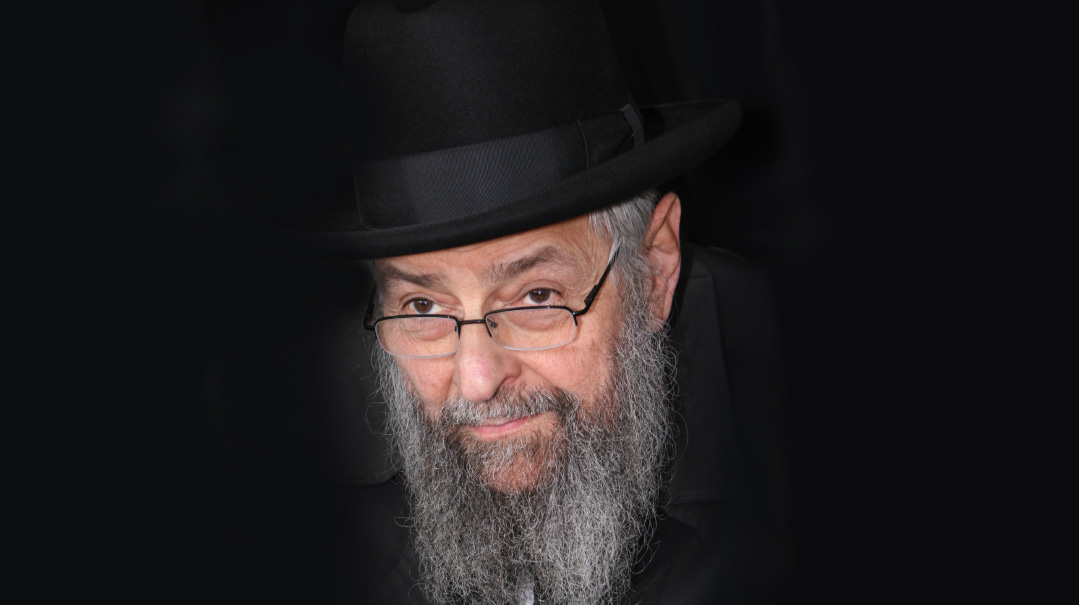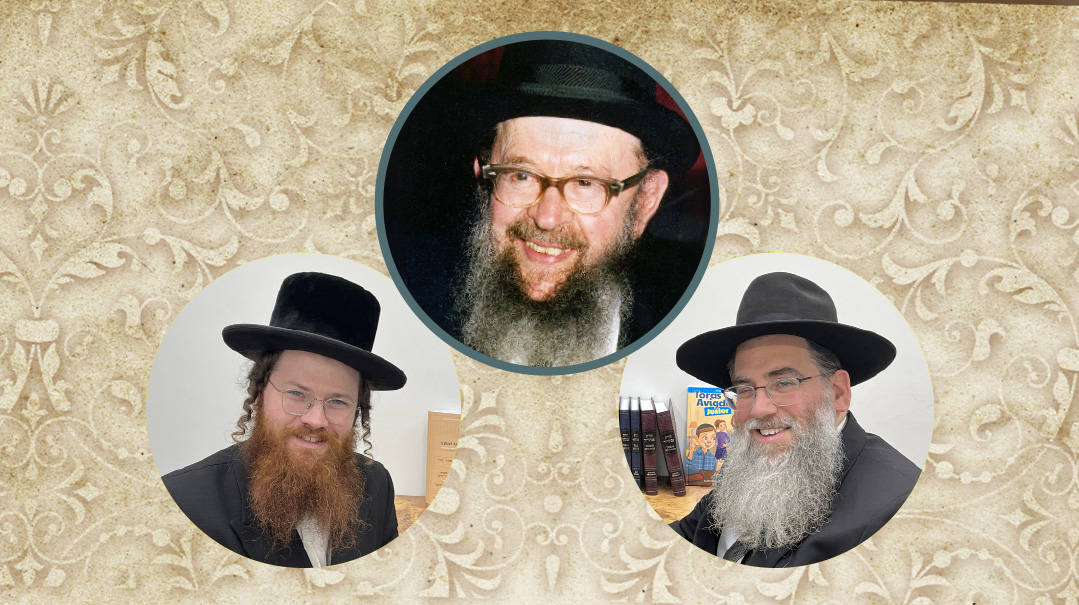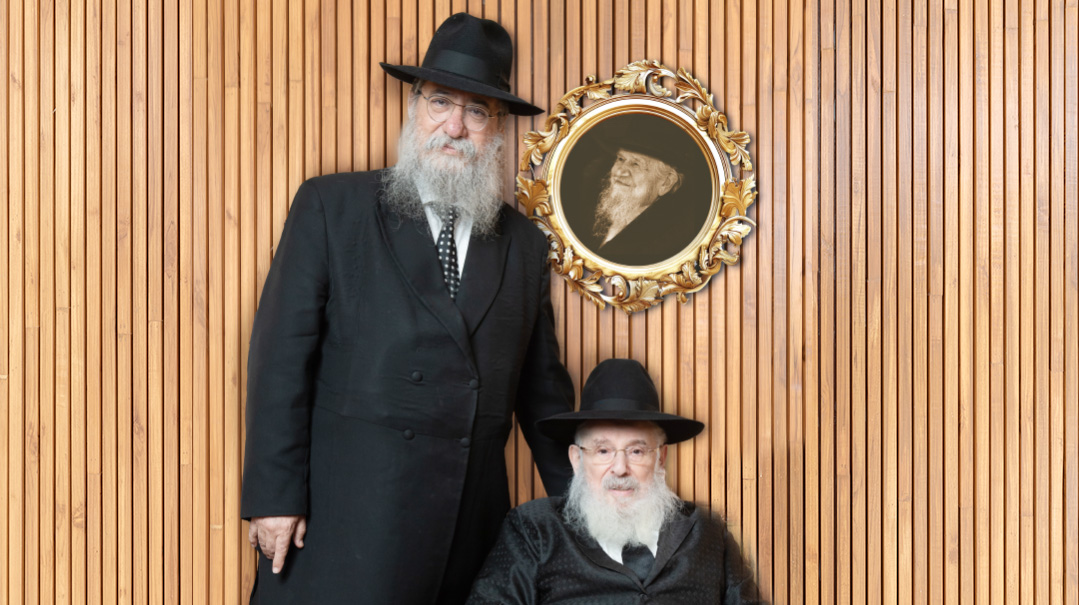Verbal Victories
| April 5, 2022Yanky Kaufman uses his own past experiences and therapy attempts to help hundreds of stutterers
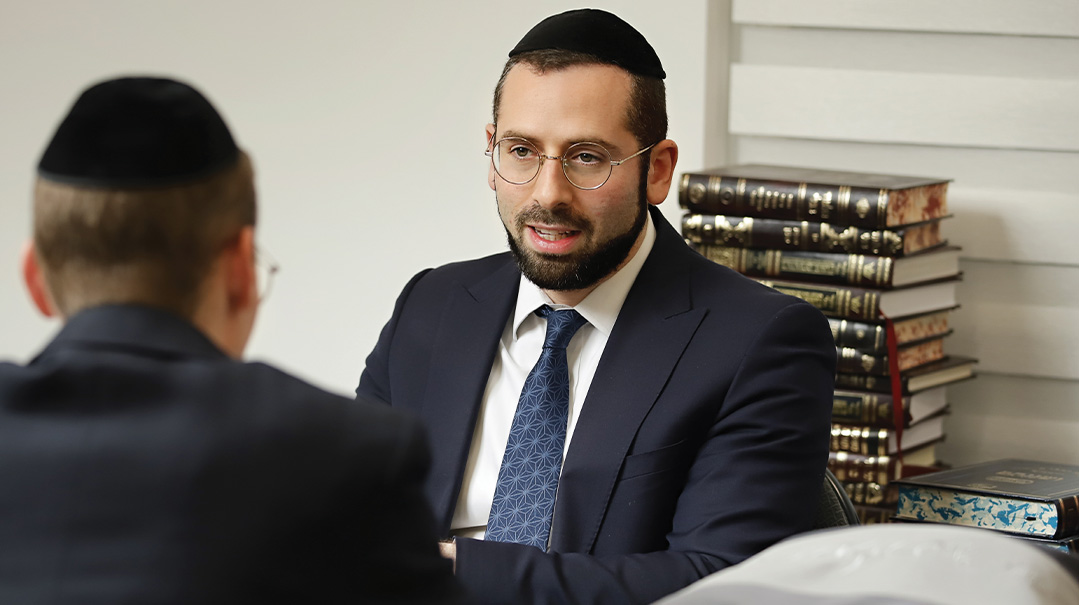
Photos: Chaya Moskowitz
It’s nearly eight p.m., and this poorly lit cul-de-sac in Jackson Township, New Jersey is eerily quiet. But the three-car garage that’s been converted into a shul is pulsating with teenage bochurim, kollel yungeleit and middle-aged men who are gathered around the bimah for a mock Krias HaTorah session in what looks like an adult version of charades.
One participant is roleplaying the gabbai, eyeballing the crowd, hastily asking people for their names, purposely pronouncing them half wrong so they are forced to correct him, and urging the “honorees” up to the bimah to recite the brachos. On cue, and with the hearty, drawn out “amee-en,” a pseudo baal korei belts out the Rosh Chodesh Krias HaTorah, relishing every nuance of the trop. A jovial Mi Shebeirach follows, and the scene plays itself all over again, with different participants playing the various roles that the assembled men have been denied all their lives — until now.
While the group seems varied, explains Yanky Kaufman, who’s brought the men together, their common denominator is the stuttering impediment they all suffered from before joining his program. Their stutters caused them to doggedly avoid any public speaking opportunity, including a lifelong evasion of being honored with an aliyah or davening from the amud. For one particular participant sporting a flowing rebbi’s beard, it meant passing up a much-coveted position at a prestigious yeshivah.
Now, thanks to his innovative stuttering therapy program, these men are speaking fluently and confidently, and at the last, culminating session of his methodical regimen, they practice their newly acquired skills in front of the entire group. As a 45-year-old participant who’s never davened from the amud in his life recites Kaddish at Maariv, to the group’s resounding amen, Yanky is beaming.
Cycle of Frustration
As the men mill around engaging easily in small talk — another daily life activity they struggled with until now — we sit down in an inconspicuous corner of the shul to talk about the program, his brainchild, borne out of his own lifelong speech struggle and eventual success.
“Let’s start from the beginning,” I prompt him. “When do you remember first starting to stutter?”
His stuttering journey doesn’t have an official start date, Yanky tells me. His speech was impeded since he started to babble his first words. “I was stuttering as far back as I can think of. All I remember from that young age was going to some big tall glass buildings, getting a snack, and playing games with a therapist.”
That initial bout of therapy lasted for years until his parents, noticing the lackluster results, decided to take a break from therapy — until the young man’s first public performance: his bar mitzvah pshetel. Even today, some 20 years later, Yanky remembers that speech — not so much for what he said, but for how he said it. “I wish I could recall the Torah I said over, but all I remember was how I stuttered throughout,” he says.
A friend of the Kaufmans suggested to his parents that they take him to a specific therapist, a well-known expert in the field. After a year with no results, Yanky wanted to move on, but the therapist insisted that they were almost at a breakthrough, and it didn’t pay to stop when they were just about there.
Another two months passed with no discernable difference, and again Yanky wanted out. The therapist was convinced though, that at this point, he was really on the cusp of achieving speech fluency. He sat through another dozen long (and expensive) sessions. Still nothing. Again, Yanky wanted to move on, and again, the therapist was insistent. (“All he needs is a few more sessions to be speaking normally. Wouldn’t it be a shame to stop working on it now, when he is so, so close?”)
This time, Yanky was done. “I was simply unwilling to go along for the ride any longer,” he remembers.
That cycle — a ray of hope, followed by frustration, and then crushing disappointment — neatly captures Yanky’s three-decade journey as he tried desperately to find a cure for his excessive stuttering. Bright, ambitious, and driven, Yanky went from one professional to the next, spoke (haltingly) to stutterers to exchange notes, scoured the library for books on the topic, devoured medical journals, and watched seminars and presentations, all to no avail.
“I wasn’t getting any better, but I remember that the sheer amount of research, information, techniques, and strategies were so vast, it at least gave me chizuk that there were so many stutter sufferers out there.” Yet those techniques and tools were almost completely useless in real life, leaving him a thoroughly knowledgeable stutterer, but a stutterer nonetheless.
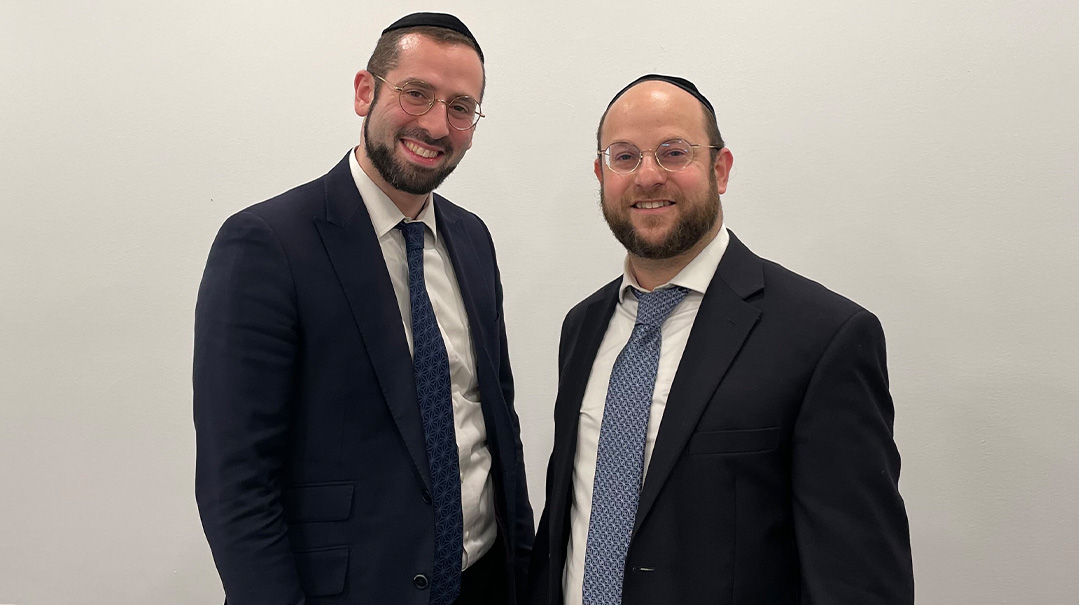
A ray of hope, followed by frustration and then crushing disappointment were part a cycle Yanky Kaufman couldn’t escape – until he had to help someone else. With supporter and popular mental health professional Moshe Norman
Locked Up
Camp can be a magical time for a child — less so if they can’t speak properly. Yanky recalls locking himself into a shack on Camp Agudah’s grounds, determined to figure out why he was stuttering.
“I sat down at times for candid, honest self-introspection, trying to solve my speech impediment that way. I tried to brainstorm on my own to make sense of my stuttering and figure out when I stutter and when I don’t,” he shares. “I remember realizing that when I speak slowly, it was easier for me, so I decided that I would beat my stuttering by training myself to speak slowly.”
Resolutely, Yanky sealed himself away and practiced talking — slowly. He imagined a friend passing by, and Yanky introducing himself, slowly. The friend asked him if he wants to head to the basketball court for a pickup game. Yanky answered, slowly. The conversation had a normal back and forth, and Yanky was able to engage, his answers measured, fluent — and slow. After a few conversations with his imaginary friend, his words started to flow. He was talking! With complete fluency! After the years of struggle, this was finally his breakthrough.
With a confidence he hadn’t felt in years, Yanky strode out. He could do this! He headed back to his bunk house, waiting for someone to approach him, and it didn’t take long. “What’s up, Kaufman?” a friend asked. Yanky was elated. He’d practiced this very question in the shack. Here was his chance!
“Guess how long it worked for?” Kaufman remembers years later, “Not even one word.”
Around the Year
“I was done with these therapies and techniques,” Yanky remembers. But he didn’t give up either. Failed regimens notwithstanding, Yanky held on to hope, and to the belief that the salvation would come, not from a degreed professional, but from the ultimate Therapist.
“I would daven three times a day at a minimum for Hashem to heal my impediment,” he says. Refaeinu became his favorite tefillah, pouring out his heart for Hashem to heal all those in Klal Yisrael suffering from stuttering. And every Yom Tov was a new inspiration.
“Rosh Hashanah, the tefillah was that this year should be the year that Your children stop stuttering. Yom Kippur was the chasimah, this year we should be signed into the Book of Normal Speech. And Succos? Everyone knows that Succos is the Yom Tov of Hashem’s hashgachah, and I would sleep in the frigid cold succah, with four blankets keeping me warm, as a segulah for Hashem’s hashgachah in speech to shine upon me.”
Chanukah, the Yom Tov of nissim. Tu b’Shevat, the day of renewal. Purim, the day the tables were turned. Every auspicious day was a day to capitalize on the opportunity for him to be able to speak with proper fluency.
At some point, people tried telling Yanky that this was his nisayon, his peckel. Everyone has some challenge in life, he was told. He should just accept his speech issue as his and move on.
“I tried that too,” Yanky says. “But the acceptance would only last until the next bout of stuttering. It was just too painful.”
All Day, Every Day
Yanky pauses, recalling those difficult days. “Why was it so painful?” he asks, as if anticipating the question. “I can’t put it into words, but I’ll try. Not being able to speak clearly affects everything.
“It affects the not-so-important things. I remember an ice cream truck came to camp, and everyone stood in line at the truck, telling the fellow if they wanted chocolate or vanilla.” Yanky really wanted chocolate, but the ch, ch sound was too much for him to muster in front of the intimidating crowd and noisy truck, so when his turn came, he opted for vanilla.
“The incident stayed in my head the whole year, and the next year, I waited until the entire line had gone so I could get my chocolate ice cream,” he remembers. “It was technically something small, but it consumed me.”
It affected decisions weightier than an ice cream flavor too, especially once he was ready to join the Mir in Eretz Yisrael.
“My decision for whose shiur I would attend was predicated in part on whose last name I would struggle the least with,” he remembers, anticipating the inevitable follow up question of “whose shiur?” when telling someone he learned in the Mir.
(He eventually settled on a maggid shiur whose name he did have difficulty with, but not before coming up with a clever work around. “I would answer ‘the oldest one in Beis Yeshaya.’ ”)
Kaufman is passionate as he discusses the wide-ranging effects of stuttering. It affects a person socially, as he’s less likely to initiate or even participate in conversations. It affects a person academically, as he’s hesitant to speak up in class. Stuttering even has a financial impact.
“I know people who chose careers that pay $20,000 to $30,000 less on average than jobs they were otherwise suited for but didn’t pursue because those jobs involved more verbal communication than the less lucrative ones,” he says.
And the pain is relentless — all day, every day. Yanky tells me that many universities include in their speech language pathology courses an assignment dedicated to “pseudo stuttering” — where students undertake to intentionally stunt their speech over the course of a given day, with the hope that these aspiring therapists will be able to not only help, but empathize with their eventual clients.
Good idea, I think, just a moment before Yanky interjects, “What a joke! That doesn’t give someone the feeling at all! The debilitating part of stuttering is that you know it will happen again. And there’s nothing you can do about it. Even if someone has a slight stutter, they suffer because they can potentially stutter at any moment.”
Yanky tells me about a person who “can count on one hand how many times he stutters in any given year.” Yet due to the unpredictability of the stutter, he considers himself to be a major stutterer.
Every Excuse
Of course, for frum Jews, stuttering adds a huge dimension of added challenge. “Our ruchniyus lives — especially for men — involve a lot of public speaking,” continues Yanky. “We know that ein habayshan lomeid — someone who is embarrassed to ask, won’t learn. And many stutterers end up falling behind in learning because they don’t ask questions, or they never tried on their own to make a leining; instead they let their chavrusas be the ones who do the talking. I myself would do that in high school.
“Then there are chaburahs in yeshivah, davening from the amud, bentshing zimun, and aliyahs in shul.” That last topic is clearly a major source of consternation for stutterers. Yanky has even compiled a “top ten list of things people do to avoid getting aliyahs.” Ideas range from the more obvious ones, like davening in the back of the shul, hoping the gabbai will be too lazy to schlep out to the back, or taking a sudden bathroom break when the aliyahs are given out, to more creative ideas like keeping one finger on the place following leining, and another finger conveniently bookmarking the start of Shemoneh Esreh. If the gabbai approaches, a quick sleight of hand will show him that the potential oleh is davening Shemoneh Esreh and is unavailable for an aliyah. A famous personality once confided in Yanky that in desperation, he claimed Levi status when approached for Shlishi, and made sure never to return to that particular minyan.
Living With It
The pain was intense, the anxiety real, and the inability to articulate his thoughts and emotions exasperating. He had tried every known remedy and then some, and yet, according to Yanky, “there was nothing coherent, comprehensive, or lasting.” Still, against the background of all that frustration, Yanky’s life moved on.
He went to mainstream yeshivos, learned with chavrusas, went to new summer camps, went to yeshivah in Eretz Yisrael, dated, got married, moved back to Israel, started to build a family, and even taught in a yeshivah, stuttering uncontrollably all the while through. The popular and talented yungerman was thriving. Yet the stuttering was debilitating and chronic, sapping and pervasive.
He welcomed a baby into the world, yet fretted over the appropriate name, vexed at the thought of not being able to properly address and refer to his own child. “The dichotomy,” he remembers, “was both frustrating and confusing.”
It seemed like things would go on like this forever, but eventually the turnaround came. Yanky shows me a piece of little, crumpled up paper that he keeps in his pocket always. Scrawled across the paper are handwritten notes he’d prepared for a meeting he had with an Israeli bochur, who stuttered terribly and was desperate for some chizuk. Someone reached out to Yanky asking him if he could meet with the bochur.
“I was told this bochur was on a downward spiral. He had opted out of yeshivah because he couldn’t take the social pressures of talking, and his parents were afraid he was going to opt out of the social scene altogether,” remembers Yanky. “He was desperate. He wanted to speak to me, to confide in a fellow stutterer who could understand him. Truthfully, I was very uncomfortable. Not that I didn’t know about chizuk shmuessen — but I was usually on the receiving end, not the giving side.”
Still, he went to meet the young bochur and decided to jot down some thoughts on paper beforehand. “I wrote down some things that were mechazek me,” Yanky recalls. “And then, while I was writing, Hashem put in my mind the idea of trying some techniques.” Yanky and the bochur met, and he decided to try some of the strategies that had failed him over the years with the bochur, adding a creative twist here and there.
During the meeting, Yanky suddenly realized this new method was working, for both of them! Both he and the bochur had gone for a few minutes without stuttering once. Still, this wasn’t the first time he’d been sure he was on the verge of a breakthrough, and he was warily hesitant.
A few days later, on Shabbos, Hashem put him in what he calls “the worst situation for a stutterer.” He met an important person who started asking him basic question, that left no wiggle room to change the answers to easier words, in front of a whole crowd.
Out of desperation, he subconsciously fell back on his experiments from the past few days and proceeded to answer all the questions fluently. He realized his new method really worked. He felt, “if I did it then, I can do anything!”
Yanky was exuberant and went home to have “the longest seudah we ever had, only stopping because I had to go to Minchah.” Yanky replays the ecstasy he felt. “I didn’t know why, but for some reason this new method was working for me. It wasn’t exotic or dramatic, but it worked.”
He spent the remainder of Shabbos talking (fluently) with his wife, dissecting the new method, breaking it down, adding and subtracting where necessary. “I came to the realization that this encompassed so many of the goals and theories of the therapists that I went to, but in a shorter and more practical and methodical way,” he says.
Sharing the Breakthrough
Yanky was elated and determined to share his breakthrough discovery with other stuttering sufferers. After Havdalah, he flipped through the local phone book of Americans in Israel, looking for names of rebbeim, roshei yeshivah, and rabbanim — anyone he thought might know people that stutter and would feel comfortable referring them to someone who could help.
The initial round of calls brought a stream of pro bono clients to his small Sanhedria Murchevet apartment.
“I started seeing one person after another, and so many of them shared my experience of doing the therapy rounds with no results. Suddenly, here we were, creating a breakthrough.”
Yanky honed his method, breaking it down into elements: “Some of the points addressed in the initial sessions include using one’s voice properly, regulating rhythm and timing of speech production, exercising the area of the brain that relates to sounds translating into words, focusing properly, improving self-confidence, breathing, and mindfulness.”
But most importantly for Yanky and his clients is that “we are getting to the root of the issue. People who stutter are lacking control over their speech. This method shows people how to be in control of their speech via speech and behavioral therapy, and provides fluency skills and a way to overcome the emotional barriers that people who stutter have.” In other words, says Yanky, whereas traditional therapy separates the stutter from the speaker and seeks to heal the former while ignoring the latter, his method “addresses not just the stutter but the stutterer.”
“What’s the most unique factor in the way we do it? We make the skills practical. A lot of people have great theoretical skills. But if they aren’t practical, then the skills aren’t catering to the typical stutterer. They will fall through the cracks, and it won’t hold up in real life or long term.”
While Yanky was suspicious of conventional speech therapy, he realized he needed professional backing to spread his method to the next level. He made a connection with a credentialed, experienced speech therapist whom he trusted. Yanky shared his method with her, and after studying it and asking a lot of questions, was all in. “She was blown away because it brought everything together, but in a sensical and coherent way,” Yanky says.
A Program Is Born
His new method was working, had the full backing of professionals, and Yanky was ready to launch it. He moved back to the United States and started giving seminars on the subject. (He recalls his father attending one session and taking an inconspicuous seat in the back. Yanky started off his presentation by giving over his personal story, and the fellow in the seat next to his father leaned over and asked in an incredulous whisper, “You really believe this guy ever stuttered? It can’t be — he’s so articulate!”)
“Each step is tweaked many times over to be made practical and customized for each person. Some components are not necessary for everyone,” Yanky says. Some clients need more intervention and are temporarily provided with some additional therapies. However, there’s a certain common denominator that people who stutter have that gives structure to the program as a whole.
“There are many barriers that people have in integrating their skills,” says Yanky, “like habits, fears, and associations, to list just a few. Each one can be a brick wall. We have a methodical therapeutic model that is customized for the individual’s social scene and level of capabilities.
“We then create a long-term plan to make clients’ success sustainable. They follow up with former stutterers who graduated our program. All these speech coaches have been for therapy in the past and have stuttered into their adult life. They provide guidance and support for the newer clients to ensure their success solidifies and their skills become second nature.”
Yanky pauses for a brief moment of nachas. “The coaches are selected when they show their PHD. Patience. Heart. Dedication. At this point we have many speech coaches all over the world. Some of the coaches are becoming speech therapists themselves and some are mental health professionals.”
The program is officially based in Jackson, New Jersey, but Yanky has run programs in England and Israel and has a team of coaches in those locations as well. Recently, Yanky has trained experienced speech therapists in Lakewood, Monsey, Brooklyn, and England who share his passion to help those who stutter. He supervises and keeps them updated with his latest breakthroughs.
Freedom of Speech
“This skills group that you’re seeing tonight,” Yanky tells me, “is extracurricular. It’s a skills groups to provide a platform for people in the program to join together in a group to breakthrough on their ‘nevers.’ ”
I look up and see the group has sat down for a roundtable discussion about overcoming their struggles. All the participants speak, each one invariably drawing on thoughts from the great mussar personalities, talking about overcoming challenges and how the struggle and process strengthens a person even outside the specific area he was working on. A good-humored rebbi, effusive in his gratitude, mentions how “we talmidim of Reb Yanky” have the tools to overcome other nisyonos as well.
A few minutes in, the crowd is joined by Moshe Norman LCSW, a highly regarded, local social worker who leads the discussion. In his gentle, reassuring therapist’s voice, Moshe probes the crowd, asking them to rate how much their stutter impeded them when they started the program, and another rating on how badly it impedes them now. One mesivta bochur, who spent the spare time after his aliyah learning energetically in a booming voice from a well-worn and marked up Gemara, says he would rate his pre-Yanky Kaufman stuttering days at a nine because he couldn’t ask his rebbi questions. “Now,” he proudly reported, “I’m down to a 0.”
Another participant exhibits complete fluency, even in this public setting, but says that “At age two, I couldn’t say the word Mommy.”
I overhear another fellow approach Yanky to talk about the program. Yanky seems to be transported to a different place, before adding, “I remember that feeling from a while ago.” Today, he’s grateful to be in a different place altogether and even more thrilled that he can bring along so many others to freedom of speech as well.
(Originally featured in Mishpacha, Issue 906)
Oops! We could not locate your form.

